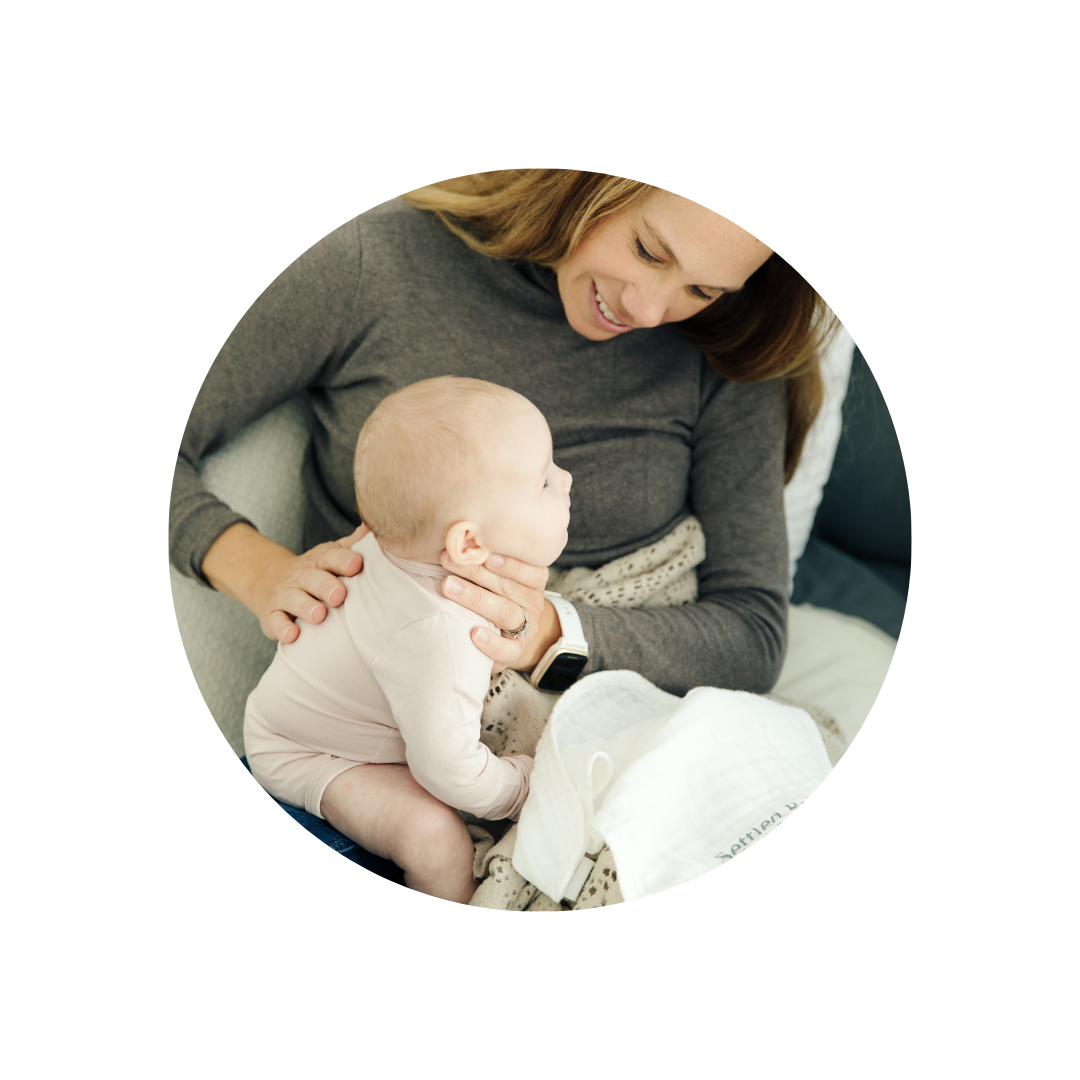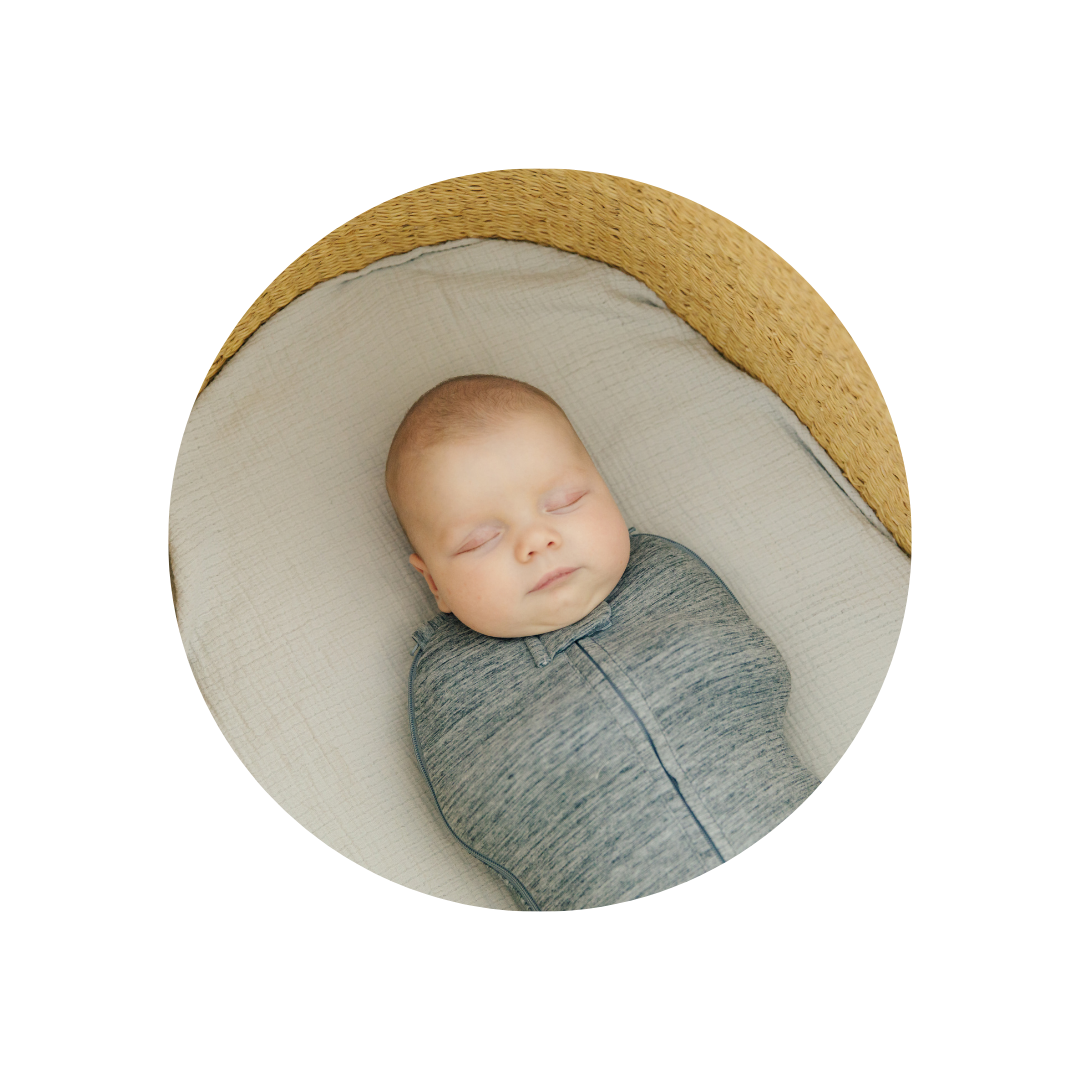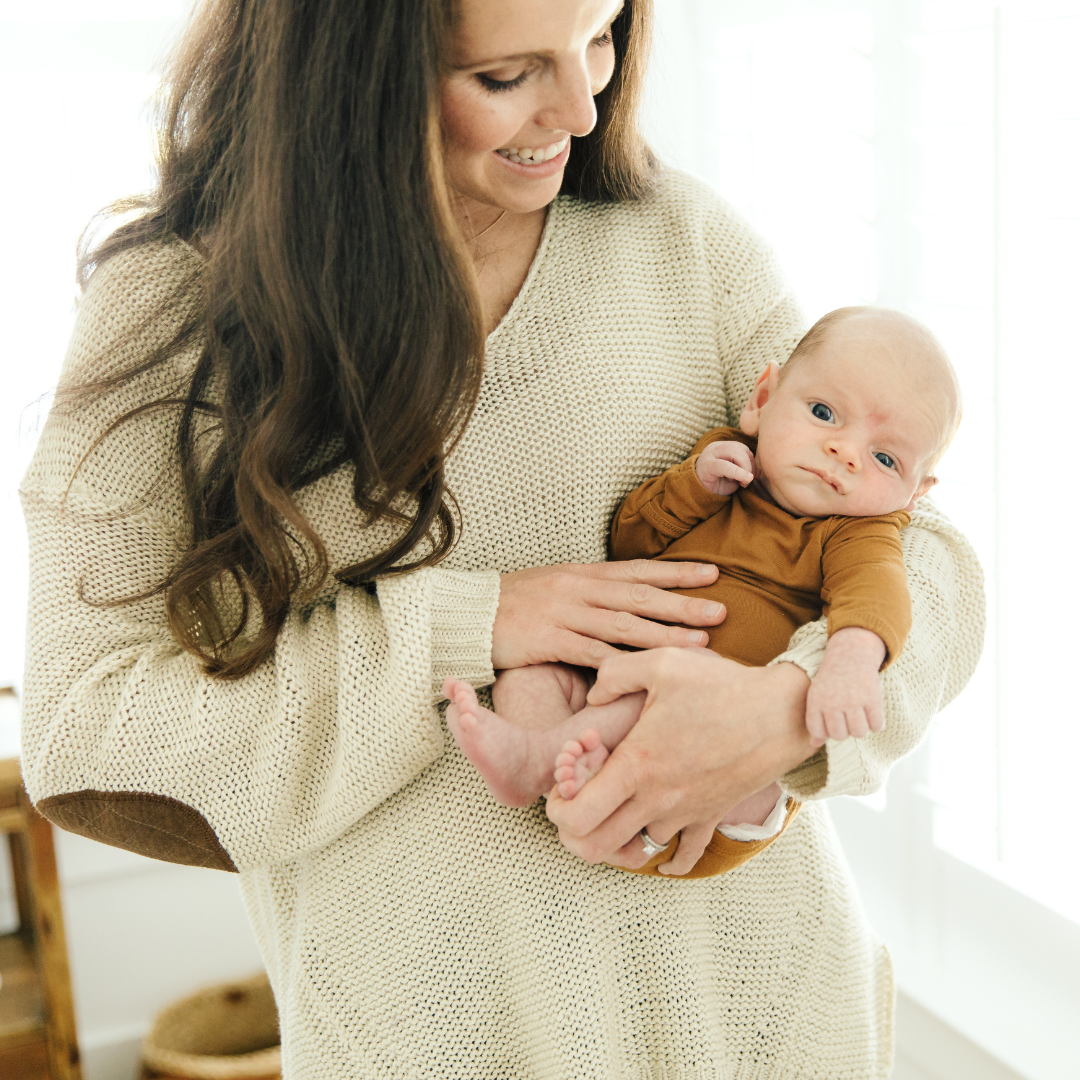Guide to Dropping Nighttime Feeds
You have options! Learn how to drop nighttime feeds (and get more sleep!) for babies 0-12 months old.
You hear people swoon over the newborn phase, and you want to love it too. But you’re exhausted. When keeping your eyelids open is a straight-up battle, everything feels hard. It’s more than being tired, though, isn’t it? It’s guilt for not being as present as you want to be. It’s fear of messing something up because you’re running on fumes. And it’s frustration… “So, this ‘no sleep thing’ is something we all just accepted?”
Be abnormal
(and rested!)
You’ve been told (over and over again) that multiple nighttime feedings are “normal” with a newborn, but show me the research that says sleeping through the night is “abnormal”!
The truth is, you can meet your baby’s milk volume intake needs during the 12 daytime hours so you can both sleep at night. It takes more than just additional feedings (or longer feedings), of course, but it is 100% doable for most babies (and, yes, absolutely normal).
Discouraged by sleeptraining that didn’t work?
There are lots of (very good!) baby sleep programs out there. But, they differ from ours in that they emphasize sleep only, not feeding + sleep. Maybe you’ve tried them; maybe they’ve even worked for you! The trouble for many moms is that those programs require a rigid regimen that can work for one little one, just not with multiple kiddos in the home. Or maybe you don’t want to be tethered to your home for several 2-3 hour windows each day… and guess what? That is just fine.
You’re a mom with better options.
Walk away with a detailed
(doable!) plan in two hours or less.
We know your focused energy is like gold these days, so we are practical, specific, and to the point.

Feeding.
We’ll explore the connection between feeding and sleeping and then get super practical about volume needs vs. wants and how to know when enough’s enough.

Napping.
Daytime sleeping does impact nighttime sleeping, of course, so we don’t skip over this vital piece of the puzzle. We just approach it differently than most.

Weaning!
Just because some babies wake for night feedings doesn’t mean yours has to. We’ll show you how to help your baby (and you!) enjoy peaceful, uninterrupted nights—step by step.
Hey, I’m Hillary Sadler, a labor & delivery nurse, feeding specialist, and mom of four. I’m also the founder of Baby Settler, a company designed to fill the gap left by (so many!) healthcare providers and baby sleep experts.
I wish I were sitting across from you.
When I became a mom for the first time, I thought I had it all figured out. I read all the books and listened to every expert on baby sleep. I was convinced that if I just followed their advice, I’d have this whole baby sleep thing down. But then, reality hit… hard. Nights were long, sleep was scarce, and nothing went as expected. I was exhausted, overwhelmed, and constantly second-guessing myself.
And breastfeeding? I was told I’d have to choose between sleep and feeding my baby the way I wanted to. I did everything “by the book,” but it felt like nothing worked. Sleep was still a struggle, and I lost confidence in myself. I kept turning to the experts, desperate to figure it out, convinced they knew best. I handed over my instincts to people who would never even meet my baby. That still shakes me to this day.
After my second baby, I realized it’s not just about sleep—it’s about sleep and feeding working together. When I finally connected the dots between them, everything changed. It wasn’t about sacrificing one for the other, but about understanding how they support each other. By the time I had my third and fourth babies, sleep came so much easier. They both slept uninterrupted for 8+ hours by 6-8 weeks old. And so have the hundreds of babies I’ve helped. Your baby can too.
That’s why I created this mini-course—to share what really works.

I implemented nighttime weaning because my babies were happy, predictable babies when they were getting uninterrupted nighttime sleep—this helped our family thrive!
– Hillary
This is my “why.” What’s yours? Do you want to feel more productive and energetic? Do you want more mental space for the important relationships in your life? Do you wish you could be more patient with everyone around you, including yourself? This mini-course will help.
In this guide, we are confident that we’ve distilled down the absolute essential information to get you where you want to be.
Made for
Mom Brain!
We’re always trying to find the balance between offering a ton of value and not overwhelming you with stuff you don’t need.
Lifetime Access to Expert Guide
You get video guidance from me, Hillary, a labor & delivery nurse, feeding specialist, and mom of four—valued at over $800—included with your mini course! Plus, come back to the information whenever you need it, even with your next baby.
Easy-to-Follow Video Series
The short videos are delivered through our very own app. They break down nighttime weaning into simple steps, all based on my real-life experience and the most effective tips after working with over 1000 families one-on-one.
Handy Downloadable PDFs
Get numerous checklists, routines, and recommendations you can easily download and refer to whenever you need them.
Quick Fixes for Common Issues
Find fast answers to over 20 common problems so you can tackle challenges without any added stress.
User-Friendly App Access
Access everything through our easy-to-use app so you can follow the guide anytime, anywhere.
Breastfeeding?
Bottle-feeding?
This guide has non-judgy tracks for both.
Let me show you around a little >>
Still scrolling? Maybe you’re wondering…
Can my baby thrive without nighttime feeds?
Yes! With the right approach, your baby can absolutely thrive without nighttime feeds. Don’t worry, I’ll show you how to know whether they’ve had enough or not. I’m a nurse and lactation consultant, and most importantly, I’m a MOM! I would never dare lead you astray.
Will nighttime weaning negatively affect my milk supply?
This is an excellent question, and I’m really glad you asked! There is a method to dropping nighttime feedings and maintaining your milk supply. It’s all covered in detail inside the guide. Don’t worry, I’ve got you covered!
Wait, what will this teach me?
Let me break it down more specifically: To help your baby sleep 11-12 hours at night, we need to ensure they meet their volume intake needs during their 12-hour day. Think of your day and night as two 12-hour blocks. To help your baby sleep through the nighttime block, we need to ensure they’re receiving enough milk to meet their volume intake needs during the 12-hour daytime block. When this happens, you’ll both be set up to get a full night of sleep. In the course, I’ll show you exactly how to pull it off!
When can I start this?
Great question! The strategy inside this guide can be started from day one with your baby. However, two weeks is when we get serious about setting your baby up to drop nighttime feeds. It’s all laid out in a step-by-step process inside the guide.
Is this just another form of sleep training?
No, this is a holistic approach that strategically focuses on daytime feedings, naturally setting your baby up to sleep through the night. However, I do give you some options for strategically dropping nighttime feeds for babies 4+ months old if you’re getting started late or if your baby hasn’t naturally dropped nighttime feeds with our no-cry methods. But it’s completely up to you if you use it. I will say, most babies naturally drop their nighttime feeds without any crying involved.
What’s your take on letting babies cry it out?
I know there are strong opinions out there about the “cry it out” method, and I’d like to share my thoughts with you. First, I do not recommend letting babies under four months old cry it out. During the first few months, babies are still developing skills like rolling to their sides, bringing their hands to their mouths, or sucking on their fingers or thumbs, all of which are key ways babies comfort themselves.
When babies are unable to self-soothe (from being swaddled, lack of skill development, etc.) crying often leads to elevated stress, increasing cortisol levels rather than helping them learn how to calm down. During these early months, crying tends to indicate a need that hasn’t been met, whether that’s hunger, discomfort, or simply being overtired. By managing wake windows and making sure they’re well-fed and comfortable, most babies at this stage can sleep peacefully without resorting to “crying it out.”
Now, when a baby is over four months old, their developmental capacity changes. At this point, they can purposefully bring their hands to their mouth and rollover. They’ve also outgrown the startle reflex that often wakes them in the early months. If your baby continues to be soothed with external help—whether that’s a pacifier, co-sleeping, or something like the Snoo—it may mean they haven’t had the chance to learn self-soothing yet. This may be a good time to try letting them cry for a little.
Of course, this approach is not about ignoring your baby’s needs. You should always be sure that they’re fully fed, comfortable, and in a dry diaper before letting them cry, but if you’ve addressed everything possible to create an optimal sleep environment, crying could simply be their way of figuring out how to soothe themselves and transition through sleep cycles. There’s no evidence-based research to suggest that letting babies cry a little under these circumstances is harmful. In fact, providing this opportunity can help them develop an important skill that will serve them well, not just in infancy but throughout toddlerhood and beyond!
What if it doesn't work for my baby?
If the nighttime weaning strategies outlined in the guide don’t seem to work for your baby, remember that every baby is unique and may respond differently to various approaches. It’s perfectly normal to encounter challenges along the way. If you find that you’re struggling, the Baby Settler team is here to help! We offer one-on-one consultations to provide personalized support and guidance tailored to your baby’s specific needs. Together, we can navigate any hurdles you may face and find the best solution for your family.
These reels took off; did you catch them?
Bottom line? You deserve rest.
I’ll never forget the haze I lived in for months after my first was born—I can spot that look in a mom’s eyes from miles away. If that’s you, please hear me when I say: You can sleep all night, and so can your baby. Mom-to-mom, I value your energy, and I would never suggest you spend it on something I didn’t believe would be an absolute game-changer.



